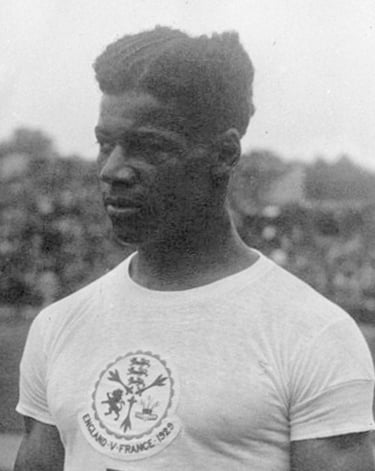

Jack London - Athlete
Jack Edward London was born on the 13th January 1905 in Georgetown, the capital of the then British colony of British Guiana (present-day Guyana), his father was a teacher and church minister. When still a toddler Jack moved with his family to London UK. The family did eventually move back to British Guiana, however Jack had fallen in love with the city he shared his last name with so in 1921 he moved back to London. He went to study at the Regent Street Polytechnic (now the University of Westminster) where he joined the running team, the Polytechnic Harriers.
Jack's sporting breakthrough came in July 1927 when he ran the 100-meter at a competition between England and France at Stamford Bridge, he clocked a time of 10.7 seconds, a British record and just short of the world record.
Jack went on to win both the 100-meter and 200-meter relay at a competition in Paris. The following year he competed for Great Britain at the 1928 Summer Olympics in Amsterdam, the Netherlands. He was Britain's second Black Olympian (the first was Harry Edward). Jack equaled the Olympic 100-meter record in the semi-finals which stood at 10.6 seconds and went on to win silver in the final and bronze with the 4x100 meter relay team. Jack was awarded the Polytechnic Harrier’s S.A. Mussabini Memorial Medal and the Studd Trophy.
Jack winning AAA race - 1928
Jack was one of the first athlete to use starting blocks at the Olympics instead of digging foot holes into the running track. Now trained by Albert Hill his career skyrocketed. In July 1929, Jack became the first British sprinter to win the Amateur Athletic Association’s 100 yards since 1924. At this point he was also a leading high jumper. In 1930 Jack suffered a defining injury to his leg, however he was able to compete against Germany in 1931 with the 4x100 meter relay, though the injury prevented him from competing at the Los Angeles 1932 Olympic games. Unfortunately the injury forced Jack to retire in 1931.
After retiring from athletics Jack became a pianist for London west end productions including Noel Coward’s musical Cavalcade in 1932 with the original cast. In 1938 he played Prince M’Bapi in the film Old Bones of the River released in 1938. During the Second World War he served as a first responder assisting the injured after bombing raids.
In 1948 Jack co-write a coaching manual with athletics journalist Joe Binks called The Way to Win on Track and Field. Later in life Jack worked as a hospital porter at London’s St. Pancras hospital.
Jack Edward London died on the 2nd May 1966 he was just 61 years of age.
